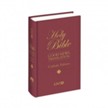Exodus 28:30
Good News Translation
30 (A)Put the Urim and Thummim[a] in the breastpiece, so that Aaron will carry them when he comes into my holy presence. At such times he must always wear this breastpiece, so that he can determine my will for the people of Israel.
Read full chapterFootnotes
- Exodus 28:30 Two objects used by the priest to determine God's will; it is not known precisely how they were used.
Deuteronomy 33:8
Good News Translation
8 (A)About the tribe of Levi he said:
“You, Lord, reveal your will by the Urim and Thummim[a]
Through your faithful servants, the Levites;
You put them to the test at Massah
And proved them true at the waters of Meribah.
Footnotes
- Deuteronomy 33:8 Two objects used by the priest to determine God's will; it is not known precisely how they were used.
Exodus 17:7
Good News Translation
7 The place was named Massah and Meribah,[a] because the Israelites complained and put the Lord to the test when they asked, “Is the Lord with us or not?”
Read full chapterFootnotes
- Exodus 17:7 These names in Hebrew mean “testing” and “complaining.”
Deuteronomy 33:8
Good News Translation
8 (A)About the tribe of Levi he said:
“You, Lord, reveal your will by the Urim and Thummim[a]
Through your faithful servants, the Levites;
You put them to the test at Massah
And proved them true at the waters of Meribah.
Footnotes
- Deuteronomy 33:8 Two objects used by the priest to determine God's will; it is not known precisely how they were used.
Exodus 17:7
Good News Translation
7 The place was named Massah and Meribah,[a] because the Israelites complained and put the Lord to the test when they asked, “Is the Lord with us or not?”
Read full chapterFootnotes
- Exodus 17:7 These names in Hebrew mean “testing” and “complaining.”
Numbers 20:13
Good News Translation
13 This happened at Meribah,[a] where the people of Israel complained against the Lord and where he showed them that he is holy.
Read full chapterFootnotes
- Numbers 20:13 This name in Hebrew means “complaining.”
Good News Translation® (Today’s English Version, Second Edition) © 1992 American Bible Society. All rights reserved. For more information about GNT, visit www.bibles.com and www.gnt.bible.
Bible Gateway Recommends









